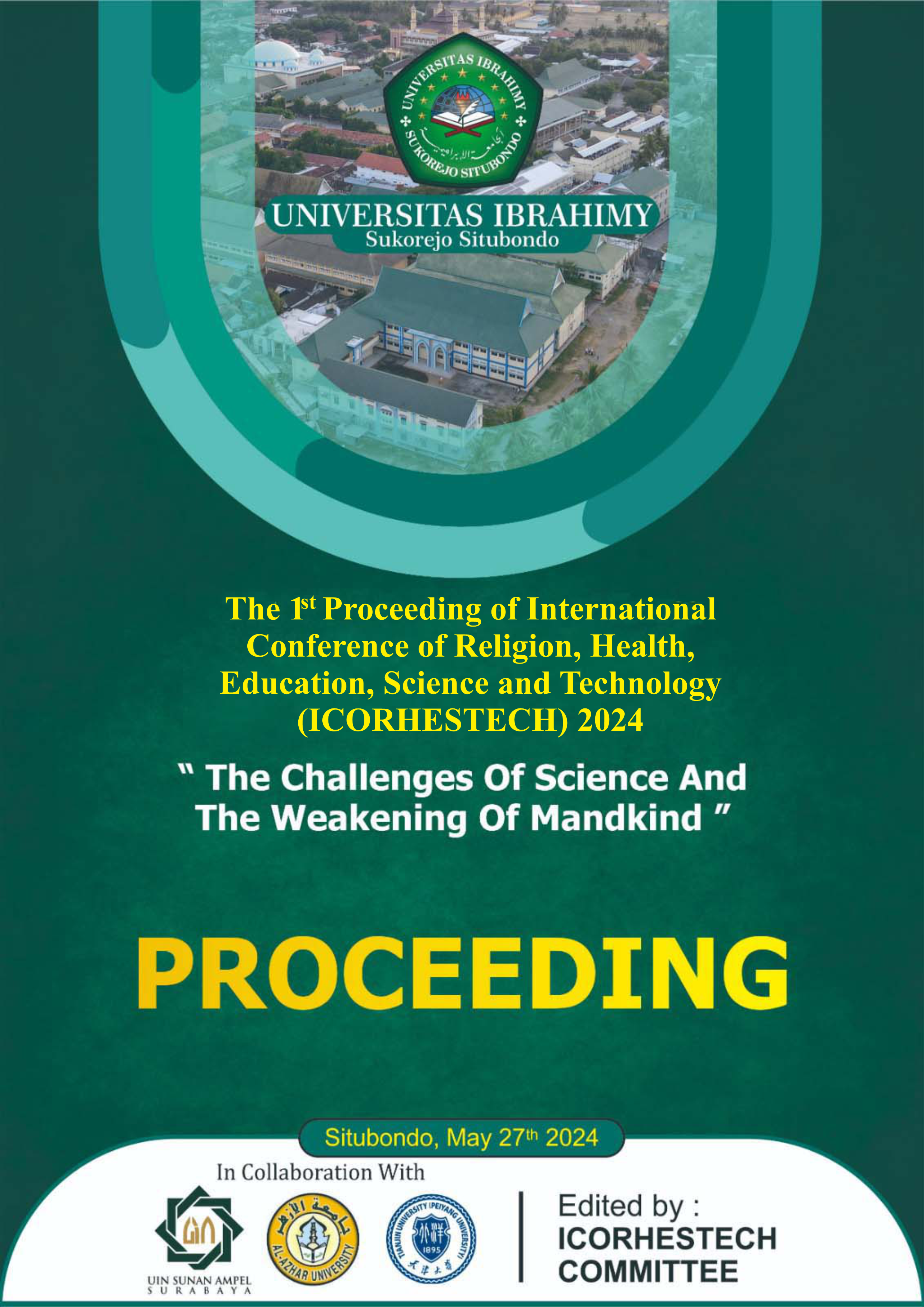Building Secure Relationships: A Review of the Literature on the Importance of Parent-Child Attachment in Early Life
DOI:
https://doi.org/10.35316/icorhestech.v1i1.5703Kata Kunci:
Child development, Parent-child relationship, Literature reviewAbstrak
Attachment between parents and children is an important foundation in a child's early development. Recent research has highlighted how important this attachment is in shaping healthy relationships and having a lasting impact on children's development. In this context, a review of the literature is important to thoroughly understand the concept of parent-child attachment in early life. A literature review methodology was used in this study to collect and evaluate recent research findings related to early life parent-child attachment. This approach allows for a comprehensive investigation into various aspects of attachment, including its effects on children's emotional, social and cognitive development. In conducting this literature review, we found that parent-child attachment in early life forms an important foundation for children's development in many ways. Research shows that secure attachment provides the child with a sense of security and comfort needed to explore the world around him or her with confidence. It also forms the basis for the development of social skills, empathy and emotional regulation essential for healthy social interactions later in life. In addition, our literature review highlighted factors that contribute to the formation of secure parent-child attachment. These include parental responsiveness to children's needs and emotions, warmth in parent-child interactions, and consistency in providing emotional support. In addition, we evaluated the impact of the family's social and economic environment and the influence of the child's internal factors, such as temperament, on attachment. The results of this literature review provide valuable insights into the importance of parent-child attachment in early life. By understanding and supporting the formation of secure attachments, parents and practitioners can play a role in ensuring that children have a solid foundation for optimal growth and development. In addition, the implications of these findings are also relevant in the context of interventions and policies to improve the quality of parent-child relationships in society at large
Referensi
Disability Rehabilitation Professional, Educationist, and Activist, New Delhi., & Yadav, M. (2023). Understanding and Addressing Youth Mental Health: Challenges and Strategies. Edumania-An International Multidisciplinary Journal, 01(03), 232–243. https://doi.org/10.59231/edumania/9010
Elentika, P. (2022). Kegiatan Parenting Pola Asuh Orang Tua Untuk Meningkatkan Kemandirian Anak Di Pos Paud Mawar. IJCE (Indonesian Journal of Community Engagement), 3(2), 1–5. https://doi.org/10.37471/ijce.v3i2.613
Gold, C. (2016). Abstracts of the 10th European Music Therapy Conference. Nordic Journal of Music Therapy, 25(sup1), 1–156. https://doi.org/10.1080/08098131.2016.11783620
Hughes, C. (2019). How do parents guide children towards ‘playing to learn’? Reflections on four studies in a special issue on self- and co-regulation in early childhood. Metacognition and Learning, 14(3), 315–326. https://doi.org/10.1007/s11409-019-09215-6
Ingoglia, S., Miano, P., Guajana, M. E., & Vitale, A. (2020). Secure attachment and individual protective factors against internalized homophobia. Journal of Gay & Lesbian Mental Health, 24(2), 136–154. https://doi.org/10.1080/19359705.2019.1688746
Kitagawa, M., Iwamoto, S., Umemura, T., Kudo, S., Kazui, M., Matsuura, H., & Mesman, J. (2022). Attachment-based intervention improves Japanese parent-child relationship quality: A pilot study. Current Psychology, 41(12), 8568–8578. https://doi.org/10.1007/s12144-020-01297-9
Krupka, M., Demchyshak, N., & Shchurevych, O. (2023). Development Of Fintech Ecosystem In Ukraine: Collaboration Between Stakeholders In Digital Society. Scientific Notes of Ostroh Academy National University, “Economics” Series, 1(28(56)), 86–95. https://doi.org/10.25264/2311-5149-2023-28(56)-86-95
Marks, L. (2017). Overview of challenges to implementation of good practice in perinatal mental health promotion and management, in universal primary care and community services. Journal of Public Mental Health, 16(3), 100–103. https://doi.org/10.1108/JPMH-03-2017-0009
Meer, L. V. D. (2016). A24 Huntington’s disease: The importance of personal relationships in early life and adulthood. Journal of Neurology, Neurosurgery & Psychiatry, 87(Suppl 1), A7.2-A7. https://doi.org/10.1136/jnnp-2016-314597.24
Mohammadinasab, H., Mazaheri, M., Reazaeizade, M., & Heydari, M. (2020). The effectiveness of ABFT- Based Parenting Training via Cell Phone on parent-adolescent conflict: A single case study. 2020 International Serious Games Symposium (ISGS), 107–114. https://doi.org/10.1109/ISGS51981.2020.9375430
Newland, L. A., Chen, H.-H., & Coyl-Shepherd, D. D. (2013). Associations Among Father Beliefs, Perceptions, Life Context, Involvement, Child Attachment and School Outcomes in the U. S. and Taiwan. Fathering: A Journal of Theory, Research, and Practice about Men as Fathers, 11(1), 3–30. https://doi.org/10.3149/fth.1101.3
Pratt, M., Hoffmann, D., Taylor, M., & Musher-Eizenman, D. (2019). Structure, coercive control, and autonomy promotion: A comparison of fathers’ and mothers’ food parenting strategies. Journal of Health Psychology, 24(13), 1863–1877. https://doi.org/10.1177/1359105317707257
Sabha, H. A. (2022). Left-behind Children: Saudi Parents’ Addiction to Internet and Its Impact on Parent- child Attachment. International Journal of Early Childhood Special Education, 14(1), 459–478. https://doi.org/10.9756/INT-JECSE/V14I1.221057
Slavković, A. (2020). Acceptance and closeness as opposed to rejection and neglect as emotional aspects of a parent/child relation, and their influence on young person’s mental health and his social competence. Zbornik Radova Pedagoskog Fakulteta, Uzice, 22, 101–120. https://doi.org/10.5937/ZRPFU2022101S
THE ROLE OF MARKETING RESEARCH IN DETERMINING THE EFFECTIVENESS OF PRESCHOOL EDUCATION IN CHILD DEVELOPMENT. (2020). Journal of Critical Reviews, 7(02). https://doi.org/10.31838/jcr.07.02.138
V, J., S, M., & R, K. (2022). Marriage Break-Ups and Its Effect on Children’s Future: An Exploration of the Novel Custody. Journal of Language Teaching and Research, 13(6), 1279–1286. https://doi.org/10.17507/jltr.1306.16
Van Bakel, H. J. A., & Hall, R. A. S. (2018). Parent–Child Relationships and Attachment. In M. R. Sanders & A. Morawska (Eds.), Handbook of Parenting and Child Development Across the Lifespan (pp. 47– 66). Springer International Publishing. https://doi.org/10.1007/978-3-319-94598-9_3
Unduhan
Diterbitkan
Cara Mengutip
Terbitan
Bagian
Lisensi








